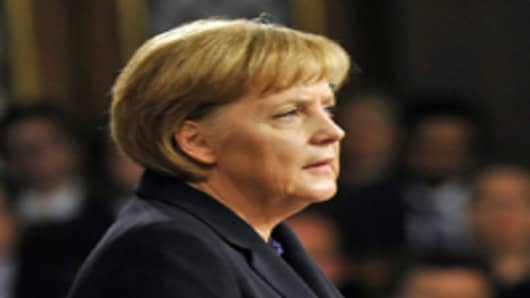Angela Merkel’s conservatives failed to win back power in Germany’s most populous state on Sunday in an election widely seen as a key test for the German chancellor and her austerity-driven crisis-fighting strategy.
Voters in the bellwether western state of North Rhine-Westphalia rejected conservative candidate Norbert Roettgen, who campaigned on debt reduction, voting instead in favor of Hannelore Kraft, the center-left social democrat (SPD) candidate and current state premier.
The victory in North Rhine Westphalia, which borders Belgium and the Netherlands and is an industrial stronghold, gives the social democrat a significant boost ahead of next year’s nationwide elections.
The election comes just a week after voters in France and Greece went to the polls and voted against political incumbents in an apparent rejection of austerity measures introduced to resolve the euro zone’s sovereign debt crisis.
"North Rhine-Westphalia is not about Greece, but it is about austerity, and the consequences of it,"Nils Diederich, professor of political science and the Freie Universitaet Berlin, told CNBC.
He pointed out that the SPD's Kraft had stressed the importance of education in her campaign, refusing to focus on savings only.
The elections in North Rhine-Westphalia would not dent Merkel's popularity significantly however, Diederich said.
"Mrs. Merkel is a very strong political personality...She is trustworthy and she is relatively stable in her positions, but pragmatic," he said.
Dierk Hirschel, chief economist at Verdi, one of Germany's largest trade unions, agreed the vote was a sign that austerity alone was not working.
"Merkel's policy failed. That's obvious now," he said.
He added the elections in France had already demonstrated that voters were rejecting "brutal austerity".
The result also comes hot on the heels of a regional election in northern German state of Schleswig-Holstein, where a coalition of Merkel’s Christian Democrats and the pro-market Free Democrats — the parties that make up the national government — lost power.
Roettgen took responsibility for the defeat, in a move that some analysts said was aimed at shielding the chancellor from political fallout – Merkel’s conservative party won just 26 percent of the vote.
The “pirate” party, which has attracted angry votersfed up with the cost of bailing out weaker euro zone nations, won 8 percent of the vote, making North Rhine-Westphalia the fourth German state in which the party has won seats in parliament.
The party wants greater openness in government but has few detailed policies and no stance on how to save the euro.




